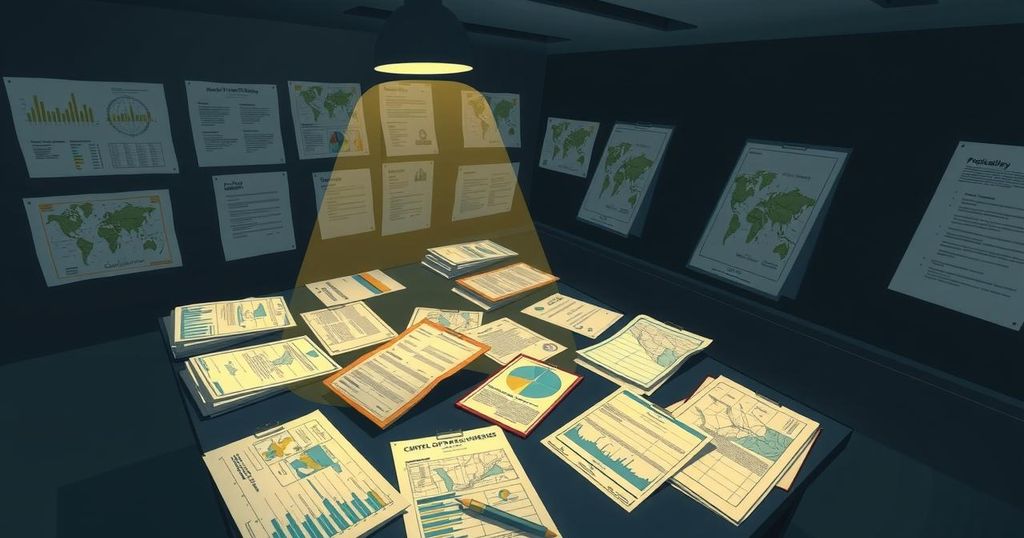World news
ASIA, BIDEN ADMINISTRATION, COLOMBIA, CUBA, DONALD TRUMP, EL SALVADOR, FREEDOM OF THE PRESS FOUNDATION, LAW, MADURO, NATIONAL SECURITY, NBC NEWS, NEW YORK TIMES, NICOLÁS MADURO, NICOLAS MADURO, NORTH AMERICA, PHILIPPINES, POLITICS, SOUTH AMERICA, TREN DE ARAGUA, TRUMP, TRUMP ADMINISTRATION, U. S, UNITED STATES, VENEZUELA
Ethan Kim
0 Comments
Intelligence Memo Challenges Trump’s Claims on Venezuelan Gang’s Ties
A declassified intelligence memo contradicts President Trump’s claims linking Venezuela’s government to the Tren de Aragua gang. Although criminal activity is prevalent in Venezuela, the document suggests that the Maduro regime does not direct the gang’s actions in the U.S. This revelation has raised questions about the Trump administration’s immigration policies and the interplay of media coverage regarding the issue.
A recently declassified memo from U.S. intelligence agencies disputes President Donald Trump’s assertions regarding the Tren de Aragua gang and its alleged direct ties to the Venezuelan government. Citing the National Intelligence Council, the memo reveals that while Nicolás Maduro’s regime allows organized crime to flourish within its borders, it is not actively controlling the gang’s activities in the United States. This development raises significant concerns about the administration’s use of the gang’s presence as a justification for strict immigration policies.
The memo states, “While Venezuela’s permissive environment enables TDA to operate, the Maduro regime probably does not have a policy of cooperating with TDA.” It was released by the Office of the Director of National Intelligence following a Freedom of Information Act request by the Freedom of the Press Foundation. NBC News received a copy from the nonprofit, which aims to uphold transparency in journalism.
Previously, Trump had invoked the 1798 Alien Enemies Act, labeling Tren de Aragua as an invading force. It’s worth noting that this historical law has primarily been utilized during wartime. The administration has claimed that the gang acts under the Maduro regime’s orders, with Trump characterizing their activities as “hostile actions” against the U.S. and its allies.
This law has resulted in swift deportations of Venezuelans and other immigrants—sending them to a prison in El Salvador infamous for its harsh conditions. The intelligence memo argues that it is misleading to assert a coordinated relationship between the Maduro regime and Tren de Aragua, pointing to Venezuelan law enforcement’s mixed approach of both cooperation and conflict with the gang, likening the relationship more to a loosely connected network rather than hierarchical control.
Interestingly, while most intelligence analysts concurred with this assessment, FBI analysts suggested that some Venezuelan officials may assist Tren de Aragua members in their migration to the U.S. They also indicated that these members might act as proxies for the regime in various South American countries, with the overarching goal of destabilizing local governments.
After the memo’s release, it drew attention not only for its implications regarding U.S. immigration policy but also for the Trump administration’s reaction. The administration has criticized press coverage of these issues as misleading, prompting investigations into leaks. Journalist Lauren Harper from the Freedom of the Press Foundation articulated concerns that the new media rules enacted by the Department of Justice serve to stifle journalists rather than ensure public safety.
The Director of National Intelligence, Tulsi Gabbard, responded sharply to the leaked intelligence, asserting that the media was misrepresenting the situation regarding foreign criminal gangs to undermine Trump’s efforts to protect Americans. She emphasized the dangers posed by illegal immigrant criminals, claiming the pain they inflict is being downplayed.
Amid this controversy, Secretary of State Marco Rubio published an op-ed asserting that it is irrelevant whether Tren de Aragua operates at the direction of the Venezuelan regime. He maintained that the regime has enabled the gang’s expansion and criminal activities, posing a clear and present danger to the United States.
In Congress, Democratic lawmakers are voicing concerns that Trump’s administration has misled the public about the ties between Tren de Aragua and the Venezuelan government. Representative Joaquin Castro from Texas stated, “the facts and evidence contradict the connection” between the gang and Maduro’s regime, underscoring a growing divide on this issue among lawmakers.
In summary, the declassified memo from U.S. intelligence has raised significant questions about the claims made by President Trump regarding the Tren de Aragua gang’s connections to the Venezuelan government. While the administration insists on a coordinated relationship, the intelligence community suggests otherwise. This dispute has also triggered concerns about the transparency and implications of media reports, as well as the repercussions for immigration policy. As the political landscape continues to evolve, the dialogue around this issue remains highly contentious.
Original Source: www.nbcnews.com




Post Comment